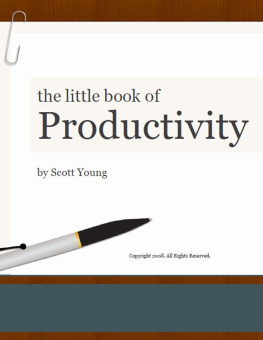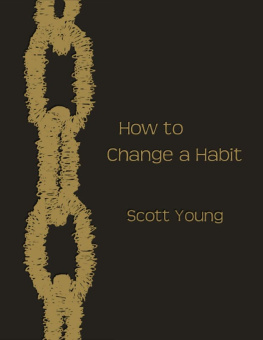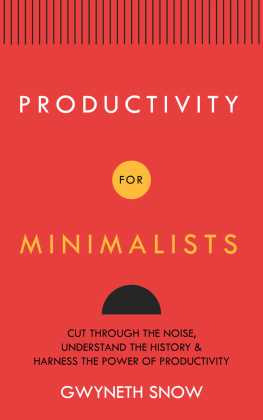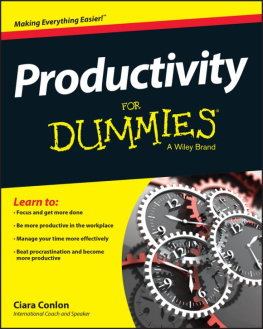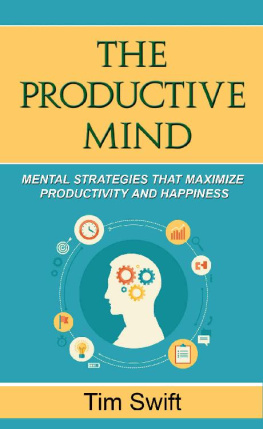Scott Young - The Little Book of Productivity
Here you can read online Scott Young - The Little Book of Productivity full text of the book (entire story) in english for free. Download pdf and epub, get meaning, cover and reviews about this ebook. year: 2008, genre: Romance novel. Description of the work, (preface) as well as reviews are available. Best literature library LitArk.com created for fans of good reading and offers a wide selection of genres:
Romance novel
Science fiction
Adventure
Detective
Science
History
Home and family
Prose
Art
Politics
Computer
Non-fiction
Religion
Business
Children
Humor
Choose a favorite category and find really read worthwhile books. Enjoy immersion in the world of imagination, feel the emotions of the characters or learn something new for yourself, make an fascinating discovery.
- Book:The Little Book of Productivity
- Author:
- Genre:
- Year:2008
- Rating:3 / 5
- Favourites:Add to favourites
- Your mark:
- 60
- 1
- 2
- 3
- 4
- 5
The Little Book of Productivity: summary, description and annotation
We offer to read an annotation, description, summary or preface (depends on what the author of the book "The Little Book of Productivity" wrote himself). If you haven't found the necessary information about the book — write in the comments, we will try to find it.
The Little Book of Productivity — read online for free the complete book (whole text) full work
Below is the text of the book, divided by pages. System saving the place of the last page read, allows you to conveniently read the book "The Little Book of Productivity" online for free, without having to search again every time where you left off. Put a bookmark, and you can go to the page where you finished reading at any time.
Font size:
Interval:
Bookmark:

Table of Contents
This is the little book with a lot of ideas. Ninety-nine of them, in fact. Seven chapters with 99 ideas to help you do more in less time. In this guide Ive collected the best productivity ideas Ive stumbled upon. Some of these are simple and others have almost doubled my productivity by adopting them.
To get you started, heres the first one:
Have a reason to be productive. Write down what you would do with more time and energy. Would you start new interesting projects? Would you lie on the beach and get a tan? If you dont have a clear outline of what you want to do with the time you save, youll just end up bored.
Having a written list of these ideas can give you the motivation to stay productive, when it is easier to fall into lazy habits. Some of these ideas will be easy, others will require practice. Clearly defining your motivation can help you with the other 98.
The Weekly/Daily Goals method is a technique Ive found extremely helpful in combatting laziness. The idea is simple:
1. At the end of each week, write a list of work you want to finish in the next seven days.
2. At the end of each day, transfer some of the tasks from your weekly list onto a new list. These are your daily goals.
3. When you complete your daily goals, stop working for that day.
The Weekly/Daily Goals method works because it forces you to break-up your infinite to-do list. Instead of trying to accomplish everything, you finish a set amount of tasks for each day. By splitting up a mountain of work into a daily chunk, it is easier to convince yourself to get started.
Keeping weekly goals as well as a daily list allows you to add non-urgent, but important items. Weekly goals keep you focused on the big picture while daily goals keep you from feeling overwhelmed.
Set a timer. Dont stop working on a task until you finish, or the time is completed. This is the essence of timeboxing, the sledgehammer of productivity tricks.
Timeboxing beats the urge to procrastinate from two directions:
1. The time amount is short (ideally between 30-90 minutes) which is less daunting than several hours of continuous work.
2. The only way to finish early is to complete the given task. This creates an added incentive to work quickly.
The real beautyof timeboxing is that often you will keep working past the timebox. Once youve built up momentum into a task or project, it is easier to keep working. Setting a timebox can be the first push you need to get started.
Try setting a 90-minute timebox the next time you cant seem to get started. Clear your desk, close your inbox and focus on working for the next ninety minutes.
Large, vague projects are the breeding grounds of procrastination. In order to get moving, you need to know the next step. Dissolve larger tasks into actionable chunks.
Your to-do list should make it obvious what should be done in the next 60 seconds. Dissolve non-routine tasks that you havent done before. If you havent prepared a tax return for a new business, getting started on this project can be difficult. Howev- er, if you break it down into steps of collecting your documents, printing an income statement and filling out relevant forms, it is easier to finish.
Dissolve tasks that you dislike doing. If you hate writing essays and need to finish a term paper, having the to-do item Write Essay wont inspire you to get work done. Instead, break it down into smaller steps. Pick Topic, Find Research Material, Create Notes, Write Thesis and similar tasks are easier to swallow.
Dissolve tasks that dont have clear stopping points. Reorganize Filing Cabinet could be done hastily in fifteen minutes or take a dozen hours of sorting and cross referencing. Without a clear organizing plan, it is easier to put the task off forever.
Sprinting Theory is the key to self-discipline. Studies have shown1, that willpower is not just a state of mind. Its an resource that can be drained and recharged just like a car battery. When you procrastinate, its not because you are a lazy person, but because your internal energy source is running low.
Sprinting Theory tries to fix this problem by encouraging you to focus on the timeframe where discipline is required. If you were running a 100m dash, the focus would be different than finishing a marathon. Sprinting in a marathon usually means you wont make it more than a few miles.
To use Sprinting Theory, try to find the relevant range of any task. This is the range where discipline is most critical. Then, when setting your timeboxes, focus on that range. It will keep you from burning out early or running too slowly. Examples:
1. Waking up. Force yourself to stay awake for 10 minutes before hitting the snooze button again. Usually, after that point, it is easier to just stay awake. 2. Habits. Focus on one behavioral change for 30 days. After that its permanent. 3. Creative Blocks. Keep churning for another 20 minutes before taking a break.
Lets play a trust exercise. Youre going to stand up and then fall backwards. Dont worry, Ill catch you.
What? You fell backwards and hit the floor. That must have hurt. Its not really my fault, see I wrote this months before youre reading it. And we arent even in the same location.
It would be understandable if you didnt trust me after my little prank. It would be hard to rely on me in the future if you cant trust me. While its easy to understand why a lack of trust damages a relationship, it can be harder to see how a lack of trust keeps you procrastinating.
When you dont trust your to-do list, its hard to procrastinate. When you finish everything on your list, and proceed to add more, thats violating trust. Before you started working, you had motivated yourself by saying you would be finished when the list was over. Adding more tasks breaks that trust, so you cant motivate yourself again.
Schedule calibration is when you have full trust in your to-do list. When it says you have a lot of work to do, you get all of it done. When it says you are finished, you stop. By keeping that trust, you avoid bad habits of both overwork and laziness.
Training self-discipline is a lot like lifting weights. If youre a chronic procrastinator, thats similar to being out of shape. Laziness isnt in your blood, its in your muscles. By lifting self-discipline weights, you build the mental muscles that can keep you going when you feel like quitting. Heres a few ways to get started:
1. The next time you want to stop working, go another ten minutes. Pushing past your quitting threshold builds muscle.
2. Figure out the duration of work you can sustain, before you start becoming distracted. The next time you work, try to go an extra 10-20%.
3. Does your mind jump between different projects? Set a goal to focus on only one activity for the next month.
Measure how strong your discipline is currently. Then use that measurement as a basis for making small improvements. Even if you can only lift 10 lbs, you can build up to 100 lbs by resistance training. You can do the same with your willpower.
A mantra is a phrase you repeat to yourself. By associating a mantra with a particular state of mind, you can use it to kick yourself into a productive state.
Think back to the smell of your mom baking cookies (or if your mother didnt bake cookies, just hallucinate with me). I bet if you got a whif of that cookie smell again it would bring back warm feelings of being at home. A mantra works the same way as your mothers cookies, although less delicious.
Next pageFont size:
Interval:
Bookmark:
Similar books «The Little Book of Productivity»
Look at similar books to The Little Book of Productivity. We have selected literature similar in name and meaning in the hope of providing readers with more options to find new, interesting, not yet read works.
Discussion, reviews of the book The Little Book of Productivity and just readers' own opinions. Leave your comments, write what you think about the work, its meaning or the main characters. Specify what exactly you liked and what you didn't like, and why you think so.

